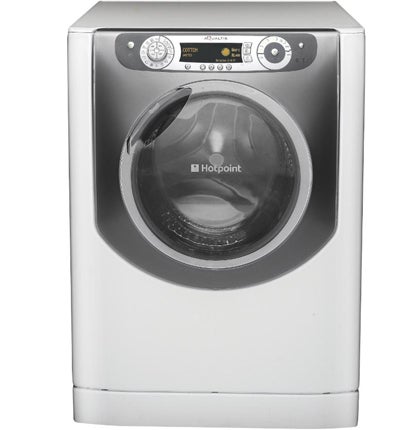They clean – but they're not so green
Washing machines do not live up to claims of energy efficiency, tests reveal

Almost half of energy-efficiency labels on washing machines are misleading, according to the Government.
Independent tests released this week revealed that 46 per cent of leading washer-dryers underestimated their energy consumption, resulting in bigger fuel bills and increased environmental damage.
Almost as many, 42 per cent, used more water than was listed on their labels, leading to bigger bills in homes with meters.
The Department for the Environment, Food and Rural Affairs commissioned the tests from an independent laboratory ahead of EU talks on toughening the rankings.
Washing machines are one of the most energy-guzzling gadgets in the home, with a washer-dryer racking up an annual electricity bill of £130.
Under current EU rules, manufacturers rate electrical goods such as washing machines A to G for energy, with A (A++ for fridges) being the most efficient and G being the least efficient. The labels also cover a number of other criteria such as washing and spin-dying performance, capacity, noise and water consumption. In an attempt to check the accuracy of the labels, Defra asked a nationally-accredited laboratory to check 24 washer-dryers, 24 ovens and 265 light bulbs. The tests were carried out December 2008 and March 2009.
All but one oven was correctly labelled. Three-quarters of new eco light bulbs passed all checks on energy consumption, brightness and wattage, but there were problems with 43 per cent of incandescent bulbs and 31 per cent of tungsten halogen bulbs.
With washer-dryers, failings were found on energy rating, consumption, effectiveness and water usage. Seven machines made by Hotpoint, CDA, Baumatic, Fagor Candy, Hoover and De Dietrich used more energy than had been stated.
Testers could not verify the performance of a further four machines made by Bosch, Siemens, Hotpoint and Whirlpool because they failed to dry clothes satisfactorily.
Ten machines, including a Tricity Bendix which passed the energy tests, used more water than stated. Almost all machines, 20 out of 24, washed clothes less cleanly than stated but Defra acknowledged this might be down to its methodology being more rigorous. Miele, Neff, LG, Indesit, AEG Electrolux and one Zanussi model sailed through all five main tests.
Environment minister Dan Norris said that manufacturers had a duty to ensure the accuracy of their labels. "When people buy a new household appliance, they need to be confident that if it says it is energy efficient, it will live up to those standards," he said.
"Many more people are now ensuring that the products they buy will use less energy and therefore will reduce both their carbon footprint and their fuel bill."
He added: This research highlights the need for these standards to be fully enforced." Defra said the appointment of a new "market surveillance authority" would step up checks.
Manufacturers stood by their labels. The Association of Manufacturers of Domestic Appliances accused the Government of using wrong and inadequate testing. Its spokeswoman Sian Lewis added: "I understand a lot of the machines they tested are being discontinued."
Clean bill of health? How the machines fared
*John Lewis JLWD 1609
Govt test: Failed on spin speed
Manufacturer response: Independent tests backed its labels
*Smeg WDF16BAX1
Govt: Failed on spin speed.
Manufacturer: Declined to retest
*Hotpoint AQGMD 149
Govt: Failed on energy and water.
Manufacturer: Challenged results but did not offer own test results
*Bosch WVD245S
Govt: Unable to verify energy and water. Manufacturer: Declined to retest
*CDA CI 830WH
Govt: Failed on energy and water
Manufacturer: Agreed its tests were at the wrong voltage
*Baumatic MEGA10WD
Govt: Failed all tests, wrong energy label on product.
Manufacturer: Not stated
*Fagor FUS 6116
Govt: Failed on energy and spin speed.
Manufacturer: Agreed its tests were at the wrong voltage
*Siemens WD12 D520
Govt: Unable to verify energy and water. Manufacturer: Declined to retest
*Zanussi ZWD 12270W
Govt: Failed on spin & water.
Manufacturer: Independent tests backed its labels
*Hotpoint DWL 540
Govt: Unable to verify energy and water.
Manufacturer: Challenged results but did not offer own test results
*Candy CMD 146
Govt: Failed energy, unable to verify water.
Manufacturer: Declined to retest
*Indesit WIDXL 126 (UK)
Govt: Failed on wash cycle energy.
Manufacturer: Challenged results but did not offer own test results
*Hoover HNWL7146
Govt: Failed on energy. Manufacturer: Declined to retest
*Whirlpool AWZ412
Govt: Unable to verify energy, failed on water. Manufacturer: None
*Tricity Bendix WDR124W
Govt: Failed on water. Manufacturer: Independent tests backed its labels
*De Dietrich DLZ69JU1
Govt: Failed on energy
Manufacturer: Agreed its tests were at the wrong voltage
*Passed
Machines from Miele, Neff, LG, Indesit, AEG Electrolux and Zanussi (model ZWD14270W1)
Join our commenting forum
Join thought-provoking conversations, follow other Independent readers and see their replies
Comments
Bookmark popover
Removed from bookmarks